Meet our MA Graduate Instructors

Our graduate students come to us from four continents: Asia, Africa, Europe, and North America. Representing almost 15 countries (such as Bangladesh, India, Pakistan, Nepal, China, Sri Lanka, Iraq, Iraqi Kurdistan, Sudan, Algeria, Egypt, Ghana, Germany and Italy), our students create a diverse community of emerging scholars, committed to learning, collegiality, cultural exchange, world citizenship, civility, and social outreach.
We currently have 37 graduate students enrolled in our programs, 22 for the MA in English and 15 for the PhD in Rhetoric, Writing, and Culture. While the majority of our students are financially supported through departmental teaching assistantships, two carry research assistantships outside of the department and one is funded through a dissertation fellowship. Five of our PhD students are self-funded and hold teaching, academic, or administrative appointments outside of the department or the university.
Damilola Precious Adenjii
Pinki Rani Das
Email: pinki.das@ndsu.edu
Office: Minard 318E2
M.A.TESOL, BRAC University, Dhaka
B.A. (Hons),English, Dhaka International University (DIU), Dhaka
Elisabeth Eller

Elisabeth Eller, MA student in English
E mail: elisabeth.eller@ndsu.edu
Office: Minard 318E26
Elisabeth Eller is a graduate student working towards her master’s degree in the NDSU English department. She is also a Graduate Teaching Assistant for first-year writing. Elisabeth received her BA in English and BA in Music from the University of Minnesota-Duluth in 2024. Her research interests include nineteenth-century British literature, ecocriticism, the Gothic, and multimedia humanities.
Fred Gaisie
Email:fredrick.gaisie@ndsu.edu
Office: Minard 318E2
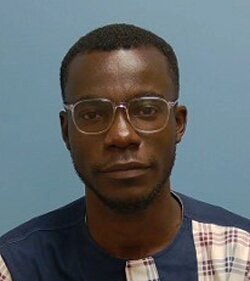
Louisa Gambah
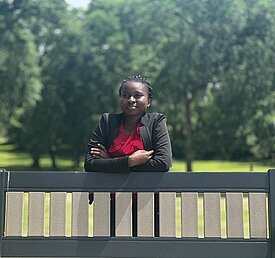
Email: louisa.gambah@ndsu.edu
Office: Minard 318E34
Louisa Gambah is an M.A. student in the NDSU English program. She received her BA in English (2019) from Kwame Nkrumah University of Science and Technology and then worked as an English teacher for four years in Ghana before moving to NDSU to continue her studies. She is a Graduate Teaching Assistant for the Department of English, teaching first-year writing. Her scholarly interests include writing studies, multilingual writing, translingual studies, genre, and pedagogy and their intersections with rhetoric and writing. Her current research focuses on translingualism in the Ghanaian X community by analyzing users’ comments on socio-political discourse.
Katilynn Herout
Email: katilynn.herout@ndsu.edu
Office: Minard 318E18
B.A., English, North Dakota State University, May 2024
Md. Imran Hossain
Email: mdimran.hossain@ndsu.edu
Office: Minard 318E30
Master of Arts, English Literature, Northern University Bangladesh, 2017
Bachelor of Arts, English Language and Literature, Northern University Bangladesh, 2016
Md Mozafor Hossain
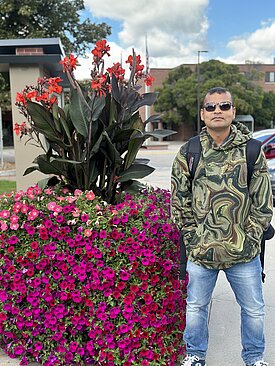
Email:mdmozaffor.hossain@ndsu.edu
Biographical Sketch:
Md Mozaffor Hossain is a Graduate Teaching Assistant in the Department of English, North Dakota State University, Fargo, North Dakota, USA. Currently, he is pursuing his second MA in English Language and Literature. He accomplished his BA Honors in English Literature in 2008 and Masters in English Language Teaching in 2009 from University of Rajshahi, Bangladesh. He taught in Dhaka International University, Northern University of Business and Technology, and Pundra University of Science & Technology. His research interests include rhetoric through everyday things, rhetoric and composition, digital rhetoric, digital pedagogy, green pedagogy, transformative learning, and psycholinguistics.
Important Links
ResearchGate: https://www.researchgate.net/profile/Mozaffor-Hossain
Google Scholar: https://scholar.google.com/citations?user=Y0wUxEsAAAAJ&hl=en
Academia: https://scholarsviews.academia.edu/mozafforHossain
ORCID ID: https://orcid.org/0000-0002-9889-4721
Arya Rogne
Email: arya.rogne@ndsu.edu
Office: Minard 318E18
Bachelors degree in Comparative Literature, University of Bergen, 2018 – 2023 | Bergen, Norway
Bachelors degree in Theater Studies, University of Bergen, 2019 – 2022 | Bergen, Norway
Mafruha Shifat
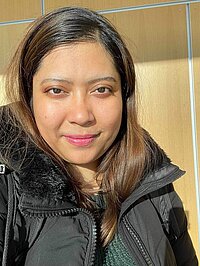
Pronoun: She/Her/Hers
Email: Mafruha.shifat@ndsu.edu
Office: Minard 318E2
Biographical Sketch: Mafruha is a graduate student (master’s) and teaching assistant (first-year writing instructor) in the English department of North Dakota State University. She is also the president (master’s) for the English Graduate Organization (EGO) during the 2023-2024 academic year. Mafruha was a writing consultant and teaching assistant (English Language and Classroom Skills for International GTAs) at the Center for Writers (Spring 2023). Her research interests are rhetorics of health and medicine, technical and professional writing, rhetorics, and composition. In addition, as an international and multilingual student from Bangladesh, Mafruha works in postcolonial studies and intercultural communication.
Kaniz Tahera
Email: kaniz.tahera@ndsu.edu
Office: Minard 318E2
M.A. in English Literature, 2017-2018, University of Rajshahi
B.A. in English, 2014-2017, University of Rajshahi
Susmita Davi Trisha
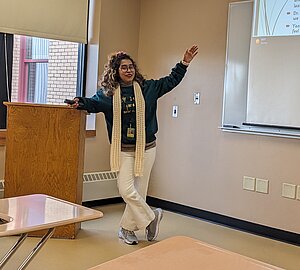
Email: susmita.trisha@ndsu.edu
Office: Minard 318E30
Biographical Sketch: Susmita Davi Trisha is pursuing a master’s degree in English at North Dakota State University and is a graduate teaching instructor, teaching College Composition II to undergraduate freshmen. Her academic journey started in Bangladesh, where she successfully completed an undergraduate program in English Language and Literature. During this phase of her education, her fascination with Early American literature flourished, igniting a strong motivation to pursue advanced studies in this field. Susmita has additionally developed a profound interest in women and gender studies and is working to align her research interests in women and gender studies with her interest in American literature to contribute to the existing knowledge in these fields. Her aim is to shed light on unexplored avenues, broaden perspectives, and foster a deeper understanding of the intricate interplay between literature, society, and gender dynamics. She is thankful to her family and her professors for supporting her journey.


